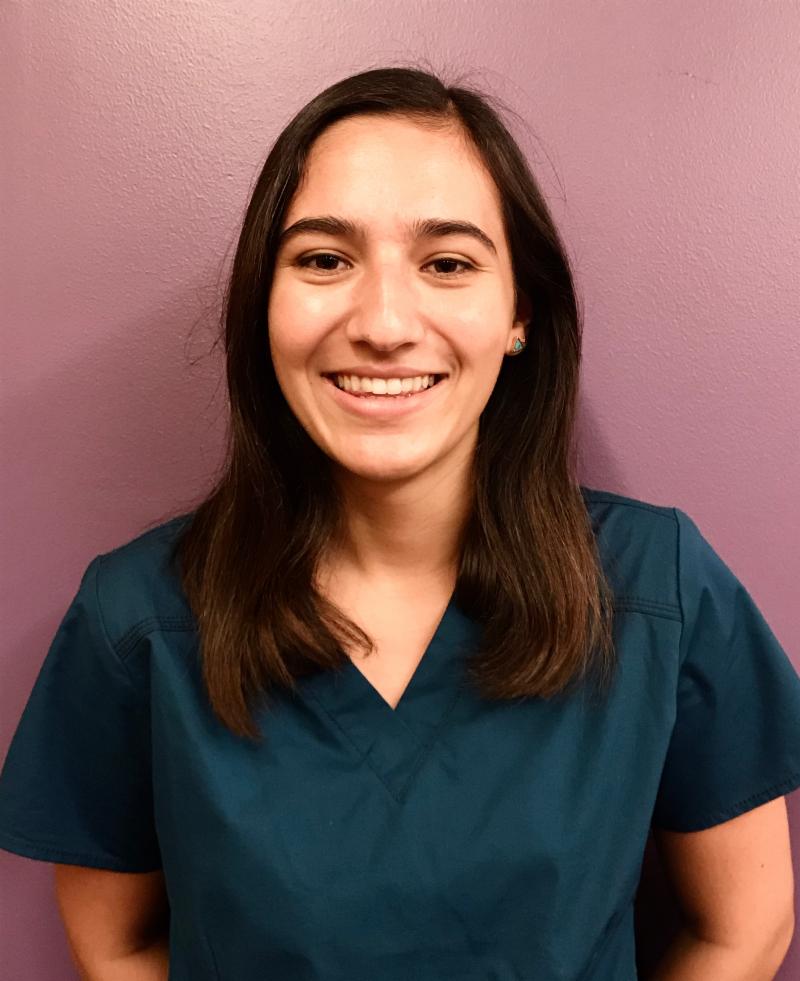Nearly 364,000 foreign students with F-1 visas were newly enrolled at a U.S. college or university in 2016, double the number at the outset of the Great Recession. The rise in foreign students far outpaced overall college enrollment growth. Explore data about foreign students in the U.S. higher education system in a Pew Research Center fact sheet.
|
|
Patient Profile
"Cuauhtemoc" came to Casa's clinic to manage his diabetes and to address the chronic back pain that seemed to be related to his work in construction.
However, at his most recent internal medicine appointment the physician noted several darker-colored patches on Cuauhtemoc's neck and recommended he see a dermatologist.
The dermatologist determined that some of the spots were benign, but sent two others off for biopsy. They returned confirming the presence of basal cell carcinoma, and Cuauhtemoc had the lesions removed the following month.
At his follow up appointment the dermatologist encouraged Cuauhtemoc to check his skin regularly for recurrent lesions, and reduce his exposure to the sun by wearing protective clothing or sunscreen.
Cuauhtemoc's case shows the value Casa provides for early detection of diseases that, left untreated, could lead to very poor outcomes.
|
|
Volunteer Spotlight
October's volunteer spotlight focuses on Mary Christman, who began
volunteering with Casa de Salud in June of 2012. As our first volunteer physical therapist, Mary pioneered Casa's ability to offer internal PT referrals to patients.
Mary Christman
Affordable physical therapy is often quite difficult to find, and much more so for our uninsured patients. Since starting at Casa, Mary has contributed countless hours of service for Casa patients, consistently holding clinic once per week.
In addition to Mary, Casa now has three physical therapists which allows us to offer around ten hours of physical therapy every week.
In Mary's own words,
"I love volunteering at Casa. Not only because I really enjoy the patients who come for therapy, but because the atmosphere at Casa is so positive. The welfare and needs of the clients are taken seriously and with great warmth. The administration, staff, and translators are caring and supportive. I know that if a client needs something, someone will work to make that happen. It is a place where clients feel safe and well cared for."
|
|
Casa Welcomes Our
New Providers

Casa thanks the following providers who have joined our team of medical professionals that care for our patients on a volunteer basis:
Sophia Ford-Glanton, MD (Urology)
Gary Myers, MD (Neurology)
Elizabeth Schechter, RN
Lynn Seacord, MD
(Cardiology)
|
|
Supporting Casa
We are very grateful to the
Foundation for Barnes-Jewish Hospital
and the
Mildred, Herbert & Julian Simon Foundation
for their financial contributions to Casa de Salud.
Please consider a tax deductible donation to Casa today. You can mail a check to our office at 3200 Chouteau Avenue, St. Louis, 63103,
give on line, or by texting "casa" to 314-270-1992.
Your generosity makes Casa de Salud the premier resource for affordable and quality care for the foreign-born community in the St. Louis region!
|
|
|
|
|
Annual Report for Fiscal Year 2018
Casa de Salud is pleased to publish its Annual Report for Fiscal Year 2018.
The theme this year is collaboration, which is especially fitting thanks to the launch of the Mental Health Collaborative. You can read it by clicking here.
|
Welcome Alyssa Bell and Talia Wazana
Alyssa and Talia both join our clinic staff as Medical
Assistants
.
Alyssa was born and raised in the St. Louis area. She has a Bachelors degree in Exercise Science from Truman State University and has two years of experience as an Emergency Room
Medical Scribe.

Talia is from Los Angeles, California and is a senior at Washington
University studying Global Health and the Environment with a minor in Latin America
n Studies.
In her free time, she enjoys hiking, cooking, and playing board games. She is interested in the social aspects of medicine and is excited to be a part of a community at Casa that helps improve access to quality healthcare.
|
Friends of Casa
Our Friends group has two great events planned for the coming months.
First, join them on October 25th for another
Talk & Tapas event featuring networking, great food and drink, and the chance to learn more about Casa's work and mission.
Then, on November 10th, come dance with Friends of Casa at Salsa for Salud! There will be a performance by SLU's Salsa team, Sazón, followed by dancing (and lessons) with live music by Son Montuno.
|
|
|
Provider Anniversaries
Casa thanks the
following providers who celebrate their anniversaries with us this month:
Robert Hill, MD - 4 Years
Paula Oldeg, MD - 3 Years
And a very special thanks to
Karen Heath, MD
one of our original medical volunteers who celebrates eight years at Casa de Salud.
|
|
Letter from the President
One of the reasons that Casa has been successful is the access we provide to quality interpretation, both through our trained volunteers and, for languages other than Spanish, via our outstanding partner
Language Access Multicultural People.
The importance of such access cannot be overstated. A
recent study found that more than 250,000 people in the U.S. die every year from medical mistakes. Your odds of being a statistic rise steeply if you have limited or no English language skills. This is a pressing issue, given that
U.S. Census data tells us that more than 63 million Americans speak a language other than English at home, and more than 25 million self-identify as having limited English proficiency.
In one sense, this problem was solved before I was even born.
Title VI of the Civil Rights Act of 1964 prevents discrimination based on race, color, religion, sex or national origin by any organization receiving federal funding. In the 1974 case
Lau v. Nichols, the Supreme Court ruled that language is a legal substitute for national origin, which guarantees equal educational opportunities to students who do not speak English as their first language. This ruling set the precedent that all healthcare providers that accept Medicare, Medicaid or some other form of federal funding cannot discriminate based on language and must supply an interpreter for Limited English Proficiency (LEP) patients.
And yet, all too often patients have no one to interpret for them or are forced to rely on a friend or family member. Why? Title VI did not come with targeted funding. Neither state nor federal agencies have a mandate to fund interpreter services. The states, of course, could take matters into their own hands, but as of last year only 13 states and the District of Columbia had agreed to reimburse the costs of medical interpreters through Medicaid.
This has to change, not only because it is the right thing to do, but because failure to do so can
increase exposure to liability.
Furthermore,
systematic reviews
have found that the use of professional interpreters improves communication substantially and helps reduce disparities across a range of medical services. In addition, access to interpreters is
associated with
patient satisfaction, patient-reported health status, and adherence with medication and follow-up visits.
Interpretation shouldn't be viewed as a convenience. It should be part and parcel of our care for patients.
Jorge Riopedre
President & CEO, Casa de Salud

|
|
|